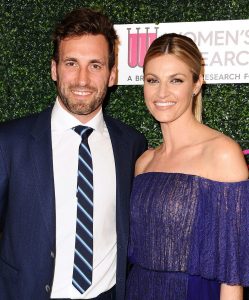Erin Andrew's Cervical Cancer Battle
- Sportscaster and celebrity host Erin Andrews, 44, is opening up about quietly fighting cervical cancer while managing her career and her mental health.
- Andrews was 38 when doctors detected cervical cancer during a routine pap screening in 2016.
- Andrews had two surgeries, preceded by in vitro fertilization (IVF) to preserve her fertility.
- Every year in the U.S., approximately 14,480 women will be diagnosed with cervical cancer.
- Nearly a third of women diagnosed will pass away from this disease.
Andrews was diagnosed in 2016 at the height of her career, and regrets not responding to the disease in a healthier way.
Read More “I actually didn’t handle it probably the best way I could have,” the Fox Sports broadcaster said in an interview for Selena Gomez’s newsletter Wondermind. “Only a really small group of people knew. And I didn’t even tell my coworkers, who are really like family to me.”
“I actually didn’t handle it probably the best way I could have,” the Fox Sports broadcaster said in an interview for Selena Gomez’s newsletter Wondermind. “Only a really small group of people knew. And I didn’t even tell my coworkers, who are really like family to me.”Andrews says she now regrets being so tight-lipped about her life-threatening ordeal.
“When it all happened, I kind of went into a state of mind where I was in week three of the football season, [and because Fox was covering] the Super Bowl that year, I did not wanna deal with it mentally at all," she said.
"For me, doing football and I was also hosting Dancing With The Stars at the time was way too important to me,” she explained. “I was so obsessed with not missing a game, not showing any weakness there, and not missing any Dancing with the Stars. So I kind of made my family and my friends deal with it, even though I was the one going through the surgeries.”

In a piece for Sports Illustrated that documented her experience with the diagnosis and the surgeries that allowed her to eventually be cancer-free, Andrews recalled stressing the importance of being able to show up to do her job as she was being wheeled into her first operating room.
“I'm not watching any football games at home. This is [Fox's] Super Bowl year, and I'm not missing the Super Bowl,” she said at the time.
Five days after that surgery, she working as a sideline reporter for a Packers-Cowboys game at Lambeau Field.
Ironically, the weakness Andrews feared people would see in her became a clear sign of her strength, and an avenue to raise awareness.
“When they were reporting [on the] morning shows, they attached the numbers and the stats of how many women do suffer from cervical cancer and why it’s so important to go get checked. I’m proud of myself for being vocal about it, even though it’s your reproductive system, it’s your vagina. Who wants to talk about that publicly?” she shared with Wondermind.
“I work in a field where it’s a ton of men, and a lot were coming up to me just thanking me because they went and told their mothers, their aunts, their sisters, their wives, their cousins to go get checked,” she said.

Years after that experience, Andrews admits she’s hard on herself when it comes to maintaining a balance between her professional and personal endeavors as well as her mental health.
“I tend to pile it on when I start thinking about something that gives me anxiety,” she said. “I’m not a person that sits there and is like, ‘You know what? What’s gonna happen is what’s gonna happen. We’re gonna deal with it.'"
The sportscaster says she now chooses to tap into the things that she knows will make her happy.
“I try to work on my breathing. This is something I started last year. I’ll turn on a meditation app and try to relax that way," she revealed. "[And] if it’s not the middle of the night, how I try to work on my mental health every day [is] working out. It helps my mental health so much. I mean, my husband always says you can tell when I’ve worked out 'cause my mood is just improved."
Erin Andrews’ Cervical Cancer Battle
Andrews was 38 when doctors detected cervical cancer during a routine pap screening in 2016.
Since she was diagnosed, Andrews has been a vocal advocate for women to stay current on their cancer screenings.
To treat her cancer, Andrews had two surgeries, preceded by in vitro fertilization (IVF) to preserve her fertility.
In an essay posted to Bulletin and titled “My seventh time doing IVF, I am not keeping it a secret anymore,” Andrews bravely outlines the struggles she’s faced with fertility, as she and her husband, NHL player Jarret Stoll, try to conceive.

She wrote that she’s trying to enjoy some downtime before NFL season kicks off, but it “has been challenging for me.” Andrews says that she’s been working long hours, and she also had to schedule IVF treatment.
“For those familiar,” she says, “you know it’s a time-consuming and emotionally draining process. This is my 7th one, and I’ve been going through these treatments since I was 35 years old.”
Cervical cancer is detected via a pap smear test, which looks for early signs of cervical cancer.
Nurse Practitioner Barbara Dehn explained in a previous SurvivorNet interview, "Many women think that a Pap smear checks for ovarian cancer, but it doesn't. Pap smears detect only cervical cancer, not all gynecologic cancers.”
She added, “In fact, there is no test that detects ovarian cancer in its earliest stages, which is why two-thirds to three-quarters of women are diagnosed at a later stage, when the disease has spread to nearby tissues and organs."
Every year in the U.S., approximately 14,480 women will be diagnosed with cervical cancer. And nearly a third of women diagnosed will pass away from this disease.
Getting pap smears to detect for cervical cancer is critically important because an earlier diagnosis may mean a better prognosis and broader treatment options.
Cervical cancer treatments may include surgery, radiation, and chemotherapy.
IVF For Cancer Fighters & Survivors
Many people fighting cancers that affect reproductive parts (i.e. cervical cancer, ovarian cancer, testicular cancer), chose to freeze their eggs or their sperm as a way to preserve their fertility prior to cancer treatment. Some cancer treatments can damage fertility, so it’s a preventative measure for people who may want to have children.
In a previous interview, Dr. Jaime Knopman, a reproductive endocrinologist at CCRM NY, says that time is of the essence when it comes to fertility conversations with your doctor. She says, “The sooner we start, the sooner that patient can then go on and do their treatment. A lot of the success comes down to how old you are at the time you froze and the quality of the lab in which your eggs or embryos are frozen in."
RELATED: Sex After A Gynecological Cancer "It's a Journey"
"Oftentimes, we just do what we call a 'fast start,'” says Dr. Knopman. “We start them no matter where they are in their menstrual cycle. Because of that, it can sometimes take a bit longer than it would for traditional IVF stimulation. But all in, you're never really talking about more than two weeks."
Fertility Preservation After a Cancer Diagnosis
Learn more about SurvivorNet's rigorous medical review process.
